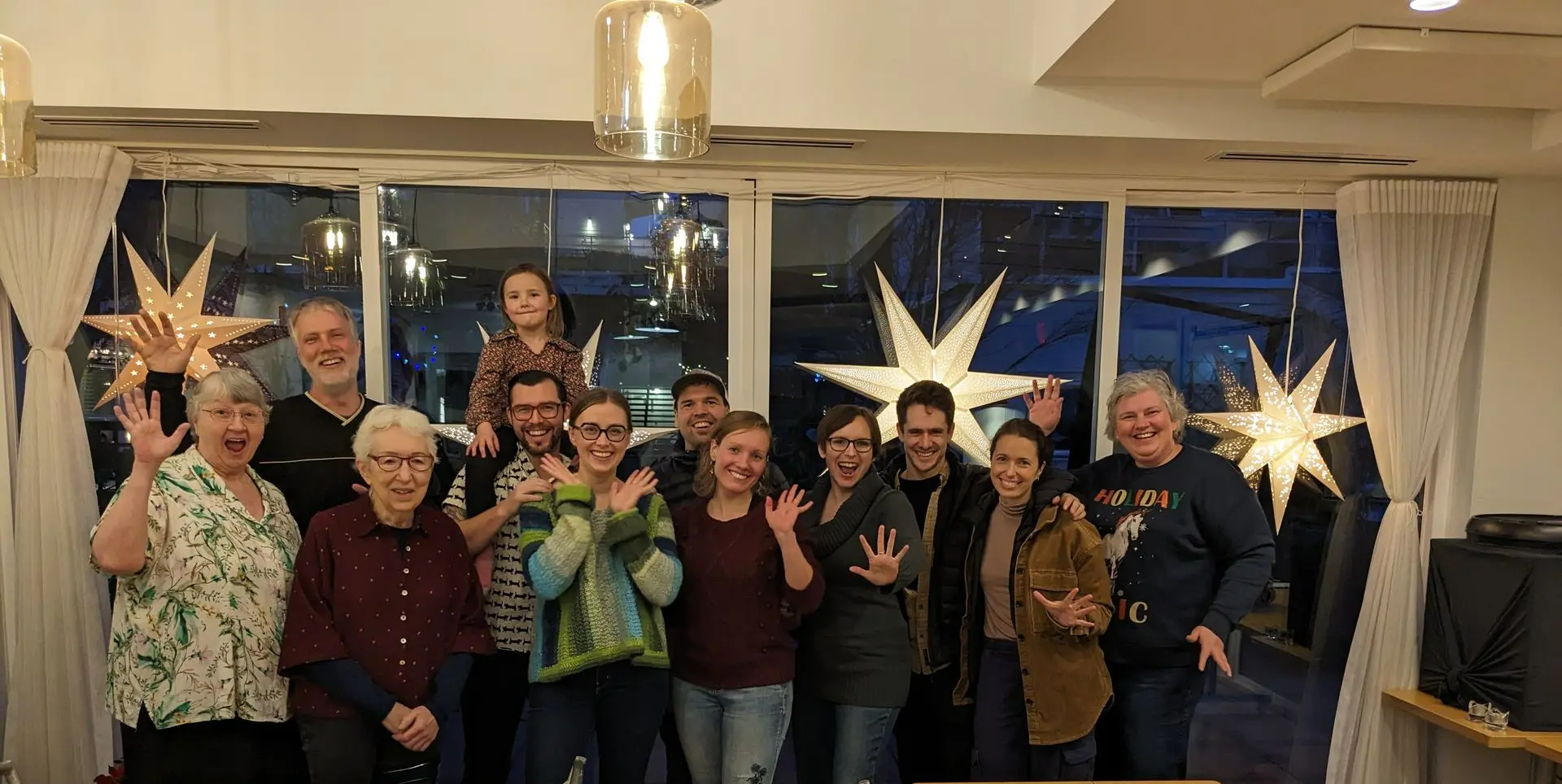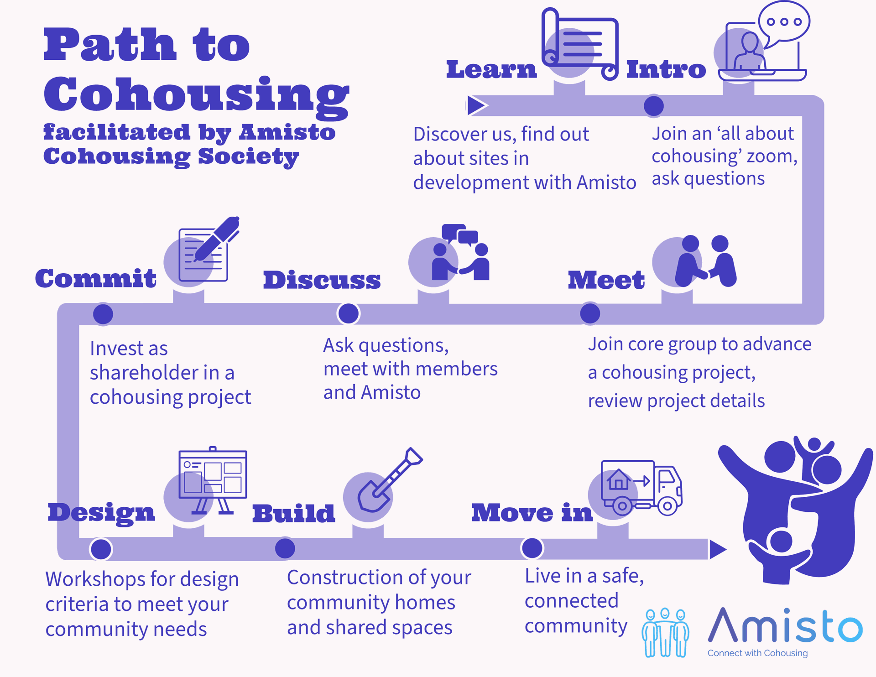Cohousing is an approach to housing that combines the autonomy of privately owned dwellings with the advantages of shared resources and community living. Residents typically participate in the planning, development, and governance of their housing community, meaning it directly responds to their needs.
The basic traits of cohousing include:

- An intention to create community
- Privately owned residences
- Shared facilities and public space
- A common house
- Self-governance
- Design input by future residents
- Optional common meals
Features of cohousing
Participatory Process: Put your stamp on it! Your values will be reflected in the development of the community, so that it directly responds to your needs.
Neighborhood Design: You’ll feel the difference. The physical design of the neighbourhood encourages a sense of community as well as maintaining privacy. Usually, there is a pedestrian-oriented design with the cars at the periphery, so you meet neighbours throughout the day, and the kids have a safe place to play.
Private Homes Supplemented by Common Facilities: In addition to your own apartment or townhouse, you will enjoy common facilities too. They typically include a dining area, sitting area, children’s play room, guest room, as well as garden and other amenities. Each household owns a private residence —complete with kitchen-but also shares extensive common facilities with the larger group.
Resident Management: You and your neighbours will take care of the community spaces and each other after move-in. The community is not dependent on any one person, even though there is often a “burning soul” that gets the community off the ground, and another that pulls together the financing, and another that makes sure you, the group, has babysitters for meetings, and another…
Sociocracy and Compassionate Communication: You and your neighbours may try sociocracy as a governance structure. Sociocracy ensures that everyone is hear, and decisions are made on the basis of “good enough to try”. Compassionate Communication (or Non Violent Communication / NVC ) is a technique for communicating compassionately. These approaches reduce some of the challenges of consensus.
General Cohousing FAQ's
(Please see the About East Van Cohousing page for questions and answers specifically about the East Van Cohousing project)
WHAT IS COHOUSING?
From the Canadian Cohousing Network:
- “Cohousing provides personal privacy combined with the benefits of living in a community where people know and interact with their neighbours. It’s about living in a way that’s responsive to a world that has changed dramatically in the last fifty years… Cohousing offers hope in our often dissociated society. Through cohousing, we can build a better place to live, a place where we know our neighbours, a place where we can enjoy a rich sense of community and contribute to a more sustainable world.”
From the Cohousing Association of the United States:
- “Cohousing is community designed to foster connection. Physical spaces allow neighbors to easily interact with others just outside private homes. Common areas including kitchen, dining space and gardens bring people together. Collaborative decision-making builds relationships.
Prefer to learn from a book? Our local public libraries can help you out:
- Creating Cohousing: Building Sustainable Communities, by Kathryn McCamant and Charles Durrett (North Vancouver City Library) (Vancouver Public Library)
- The Cohousing Handbook: Building a Place for Community, by Chris ScottHanson and Kelly ScottHanson (North Vancouver City Library) (Vancouver Public Library)
- The Senior Cohousing Handbook: A Community Approach to Independent Living, by Charles Durrett (North Vancouver City Library) (Vancouver Public Library)
COMMUNITY BUILDING
Cohousing community values are based on working cooperatively. We will work together to create this community, both in terms of the building under construction, and the social connections amongst neighbours.
PARTICIPATION
Our community will succeed and thrive based on member participation. Each person finds their own niche, based on their skills, passions and capacity to contribute. In addition, we recognize that flexibility is important (e.g. new baby, family illness, disability).
Typical areas in which people choose to participate are governance (e.g. committees, facilitation, record keeping, bookkeeping), physical work (e.g. gardening, maintenance) and community building (e.g. social events, conflict resolution).
The community will also have a system of common meals. typically meals are provided 3 to 4 times per week and are optional to attend (if it works for your schedule and sounds tasty!). In each 4 week cycle, everyone signs up for 2 cooking and/or cleaning shifts, according to their skills and interests. Each meal is cooked by a team of 3 people, gratefully enjoyed by a group of neighbours, and then cleaned up by a team of 3 people.
CONSENSUS DECISION-MAKING
Cohousing typically uses consensus decision-making, which is a cooperative process in which the community works together to understand an issue and develop a suitable proposal, and agrees to support a decision that is in the best interest of the whole group (as opposed to a decision that is in the best interest of certain individuals). In cohousing jargon, it usually works out as “most people get most of what they want, most of the time”.
MANAGING CONFLICT
While we aim to be respectful of our neighbours and understanding of different perspectives, we know that interpersonal conflict is inevitable with 20 to 30 households and 10 to 15 children living on one-third of an acre. As such, we have skills and strategies to give and receive feedback and to constructively address conflicts. Over the years, we expect to go through some awkward conversations, but that’s preferable to letting a disagreement with a neighbour fester.
OWN YOUR HOME
As with any condo, each household purchases their own unit and a share of the common facilities. If a mortgage is needed, each household qualifies for their own personal mortgage. Each household is responsible for paying monthly strata fees to the strata corporation and annual property taxes to the City.
FUTURE RESALE
As with any strata titled unit, owners can sell their unit in the future for market value*, and the owners choose who to sell their unit to. The community can provide marketing support (e.g. website listing and tours of community amenities) but the community does not ‘screen’ or ‘approve’ potential purchasers.
Strata homes in cohousing communities tend to have comparable market values to similar units in their neighbourhoods; however, very few other strata developments have the same level of common amenities as provided in a cohousing community.
BC STRATA PROPERTY ACT
As with all strata titled properties, these homes fall under the BC Strata Property Act. As such, the community operates with a strata corporation, strata council, monthly strata fees, annual operating budget, and contingency reserve fund. Details are available to potential purchasers through a disclosure statement.
STRATA BYLAWS
Comprehensive information about a strata corporation is available for potential purchasers; however, some commonly asked questions are answered below:
- Cohousing tends to use consensus as the decision-making method for council meetings, instead of relying on majority vote
- All units are represented on the strata council, not just a few households
- Cohousing is typically a pet-friendly community
- Rentals are usually permitted
- Smoking / vaping is generally not permitted anywhere on the property
PURCHASING A HOME
This website does not constitute an offering for sale. Any such offering can only be made by way of a disclosure statement. Potential purchasers are welcome to contact us for more information, as well as our disclosure statement.
QUALIFYING FOR A MORTGAGE
As with other strata titled complexes, each household purchases their own home. If a mortgage is needed, each household must qualify for the mortgage and may choose their personal mortgage based on the advice of their mortgage professional. The Purchase & Sale agreement requires a 10% deposit, but your preferred mortgage may require a higher down payment. Please contact your mortgage professional to determine your mortgage qualification limits.
PURCHASING A HOME
This website does not constitute an offering for sale. Any such offering can only be made by way of a disclosure statement. Potential purchasers are welcome to contact us for more information, as well as our disclosure statement.
BECOMING PART OF OUR GROUP
The future members will also be the directors and shareholders of the development company.
Becoming part of our company is an option for the future purchasers of our available units, which would allow your household to participate in decisions before move-in, giving you more control into the development of your future home. Please contact us for more information about the details, benefits and responsibilities of joining the development company.
COMMUNITY BUILDING
Cohousing community values are based on working cooperatively. We will work together to create this community, both in terms of the building under construction, and the social connections amongst neighbours.
PARTICIPATION
Our community will succeed and thrive based on member participation. Each person finds their own niche, based on their skills, passions and capacity to contribute. In addition, we recognize that flexibility is important (e.g. new baby, family illness, disability).
Typical areas in which people choose to participate are governance (e.g. committees, facilitation, record keeping, bookkeeping), physical work (e.g. gardening, maintenance) and community building (e.g. social events, conflict resolution).
The community will also have a system of common meals. typically meals are provided 3 to 4 times per week and are optional to attend (if it works for your schedule and sounds tasty!). In each 4 week cycle, everyone signs up for 2 cooking and/or cleaning shifts, according to their skills and interests. Each meal is cooked by a team of 3 people, gratefully enjoyed by a group of neighbours, and then cleaned up by a team of 3 people.
CONSENT BASED DECISION-MAKING
Cohousing typically uses consent based decision-making, which is a cooperative process in which the community works together to understand an issue and develop a suitable proposal, and agrees to support a decision that is in the best interest of the whole group (as opposed to a decision that is in the best interest of certain individuals). In cohousing jargon, it usually works out as “most people get most of what they want, most of the time”.
MANAGING CONFLICT
While we aim to be respectful of our neighbours and understanding of different perspectives, we know that interpersonal conflict is inevitable with ~30 households with members young and old living in an apartment building. As such, we have skills and strategies to give and receive feedback and to constructively address conflicts. Over the years, we expect to go through some awkward conversations, but that’s preferable to letting a disagreement with a neighbour fester.
CHILDREN
Children benefit from living in a multigenerational cohousing community; there are always other kids to play with (and to practice working out differences) and neighbours available to supervise a park mission, read a book or teach a craft.
ADULTS
Especially for parents of young children, cohousing can smooth some of the wrinkles of day-to-day life. Besides the convenient camaraderie of our common meal system, knowing your neighbours comes in handy when school has early dismissal or you’re hoping to swap childcare.
SENIORS
Seniors can be vulnerable to isolation, and aging in place in a community where you’re known – and needed – can alleviate that risk.
